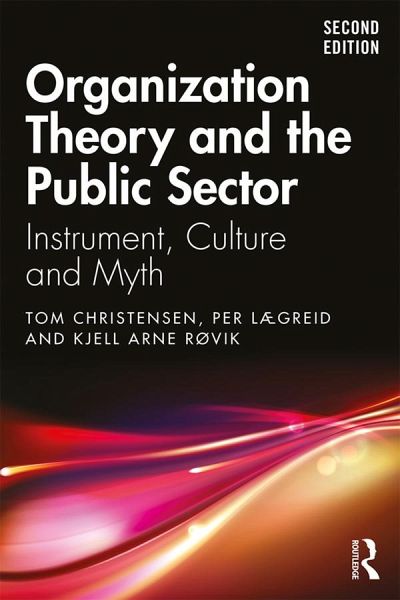
Organization Theory and the Public Sector
Instrument, Culture and Myth
Versandkostenfrei!
Versandfertig in 6-10 Tagen
41,99 €
inkl. MwSt.
Weitere Ausgaben:

PAYBACK Punkte
21 °P sammeln!
Public-sector organizations are fundamentally different from their private-sector counterparts. They are part of the society's political organizations and are major political actors. They are multifunctional, follow a political leadership and the majority do not operate in an external market. In an era of rapid reform, reorganization and modernization of the public sector, this book offers a timely and illuminating introduction to the public-sector organization that recognizes its unique values, interests, knowledge and power base.Drawing on both instrumental and institutional perspectives wit...
Public-sector organizations are fundamentally different from their private-sector counterparts. They are part of the society's political organizations and are major political actors. They are multifunctional, follow a political leadership and the majority do not operate in an external market. In an era of rapid reform, reorganization and modernization of the public sector, this book offers a timely and illuminating introduction to the public-sector organization that recognizes its unique values, interests, knowledge and power base.
Drawing on both instrumental and institutional perspectives within organization theory, as well as democratic theory and empirical studies of decision-making, the book addresses five central aspects of the public-sector organization:
- goals, values and motivation
- leadership and steering
- reform and change
- effects, learning and implications
- understanding and design
The book challenges conventional economic analysis of the public sector, arguing instead for a political-democratic approach and a new prescriptive organization theory. A rich resource of both theory and practice, Organization Theory and the Public Sector: Instrument, Culture and Myth is essential reading for anybody studying the public sector.
This second edition of the book contains a range of new and updated themes, examples and references.
Drawing on both instrumental and institutional perspectives within organization theory, as well as democratic theory and empirical studies of decision-making, the book addresses five central aspects of the public-sector organization:
- goals, values and motivation
- leadership and steering
- reform and change
- effects, learning and implications
- understanding and design
The book challenges conventional economic analysis of the public sector, arguing instead for a political-democratic approach and a new prescriptive organization theory. A rich resource of both theory and practice, Organization Theory and the Public Sector: Instrument, Culture and Myth is essential reading for anybody studying the public sector.
This second edition of the book contains a range of new and updated themes, examples and references.














